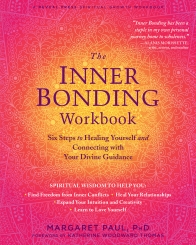By Margaret Paul, author of The Inner Bonding Workbook
Most of us have heard that you can’t love someone else until you love yourself. Let’s explore why this is true. We’ll start with a question: What does it mean to love yourself?
Loving yourself is about taking responsibility for all your feelings—your pain, joy, self-worth, and sense of safety. Words often used to describe the feeling self are essence, soul, true self, or inner child. Loving yourself by taking responsibility for your inner child—your feeling self—is the opposite of abandoning your feelings. Many people, without realizing it, abandon themselves in four major ways:
-
They judge themselves rather than accepting and valuing themselves.
-
They stay focused on their mind and ignore their body, which is where their feelings are.
-
They turn to various addictions to avoid and numb their feelings, rather than turning toward their feelings and learning what their feelings are telling them.
-
They make others responsible for their feelings by trying to control their love, rather than loving themselves and being able to share their love.
When we abandon ourselves, we feel awful inside—anxious, depressed, angry, ashamed, jealous, empty, or alone. Self-abandonment creates a sense of neediness, which leads to trying to get from others what we are not giving to ourselves.
How Do You Relate to Your Partner or Others?
Think for a moment about what state you are in when you are with your partner, family members, friends, or coworkers. Do you feel peaceful and full inside, and enjoy sharing your caring and love with others who are important to you? Or are you hoping to get their love, approval, or attention, or to avoid their disapproval?
If you are trying to get love rather than share love, what are you doing to try to control their love and approval?
-
Are you a people pleaser, being overly nice and giving—giving yourself up to get love?
-
Are you critical, judgmental, and blaming, trying to intimidate the other person into giving you what you believe you need to feel that you are okay?
-
Do you shut down and withhold your caring, hoping the other person will stop doing whatever they are doing that you don’t like?
What happens in your relationships when you try to control in any of these ways? Do you end up feeling loved or unloved?
Loving Yourself Changes All This!
The one major cause of relationship problems is self-abandonment, which leads to neediness, which leads to controlling behavior, which then leads to a lack of intimacy and connection with others. Can you see the vicious cycle?
When you learn how to love yourself by taking responsibility for your feelings, you feel peaceful, happy, and full of love inside—you have love to share with others. When two people in a relationship are each loving themselves, they come to each other excited to share their love, excited to learn and grow with each other, and excited to share fun, passion, and companionship with each other.
Margaret Paul holds a PhD in psychology and is a relationship expert, noted public speaker, workshop leader, educator, consultant, and artist. Heal yourself and your relationship with Dr. Margaret’s new book, The Inner Bonding Workbook.



 2024 Peace Playbook: 3 Tactics to Avoid Clashes with Your Partner
2024 Peace Playbook: 3 Tactics to Avoid Clashes with Your Partner